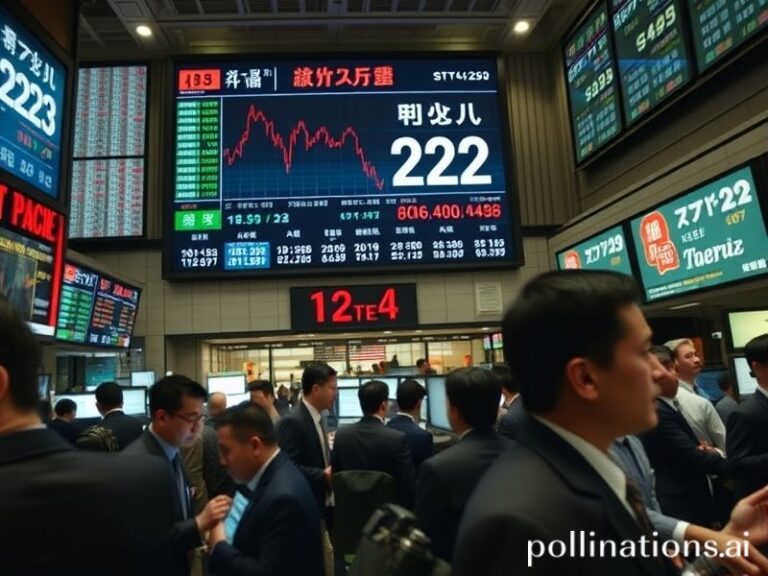Livvy Dunne: How a Louisiana Gymnast Became the World’s Newest Soft-Power Superpower
PARIS—In the Marais, a barista who normally sneers at anything more commercial than Serge Gainsbourg is humming “Livvy Dunne” to himself while foaming oat milk. In Lagos, a streetwear reseller is hawking knock-off LSU leotards to university freshmen who have never watched a full gymnastics meet. In Seoul, the subway ads for a vitamin drink now feature a pixel-perfect Korean gymnast striking a pose that is legally distinct from, but spiritually identical to, Olivia Dunne’s trademark hair-flip. Somewhere in between, the algorithm quietly recalibrates the global attention economy, and a 21-year-old from Louisiana becomes the petri dish for late-capitalist soft power.
Welcome to the planetary ripple effect of Livvy Dunne, the NCAA gymnast whose 12 million TikTok followers outnumber the populations of Jordan, Switzerland, and Austria combined. While diplomats still insist that influence is measured in aircraft carriers and G7 summits, the metrics now say otherwise: one viral split leap can shift supply chains faster than a trade embargo. Never mind that her actual sport lasts 90 seconds on a good day—long enough for a geopolitical blink, but sufficient for Nike to green-light a children’s apparel line in Jakarta.
The international development crowd likes to talk about “leapfrogging,” the charming notion that a remote village can skip landlines and jump straight to smartphones. Livvy has performed a similar maneuver on fame itself: vaulting over the traditional gatekeepers—network executives, Olympic committees, even the once-almighty Wheaties box—only to land squarely on the For You page of a 14-year-old in Kuala Lumpur who now dreams of Baton Rouge instead of Hollywood. Call it cultural parkour, performed with a glitter scrunchie.
Naturally, the old world is disoriented. French television recently devoted eight minutes of prime time to asking whether “la gymnaste influenceuse” spells doom for l’exception culturelle. The segment cut between an earnest academic from Sciences Po and a slow-motion replay of Livvy waving an American flag emoji. Somewhere, Jean Baudrillard’s ghost took another sip of absinthe and muttered, “Told you so.” Meanwhile, the Russian Ministry of Sport—no stranger to geopolitical choreography—has allegedly studied her metrics to refine its own “patriotic youth content pipeline,” proving that even Cold War leftovers can learn new dance routines.
But the real action is in the markets you can’t see from the broadcast booth. In Ho Chi Minh City, a micro-influencer agency runs after-school workshops on “the Dunne aesthetic,” teaching Vietnamese teens how to angle ring lights for maximum cheekbone. In Nairobi, a fintech startup offers micro-loans denominated in “Livvy Points,” redeemable for gymnastics lessons or data bundles—whichever burns more calories. The International Monetary Fund, ever the killjoy, has begun modeling “attention inflation,” warning that if too many economies peg their aspirations to a fluctuating smile, the next crash might be measured in serotonin rather than subprime mortgages.
And yet, for all the talk of soft imperialism, there’s something almost quaint in the spectacle. The Romans had bread and circuses; we have protein oats and back-handspring tutorials. Same circus, smaller bread portions. Livvy herself remains professionally chipper, dutifully captioning posts with “God’s timing ⏰” while the comment sections devolve into proxy wars over NIL regulations, body autonomy, and whether her last routine was scored by judges or the Dow Jones. Somewhere in the noise, a Belarusian teenager who can’t legally protest at home practices a cartwheel in her bedroom mirror, imagining it as a small act of airborne defiance. The algorithm registers the uptick in Eastern European engagement and schedules an extra ad buy for Nike Air Zooms.
Conclusion: On paper, Livvy Dunne is an American college athlete who can do flips. In practice, she has become the carrier wave for a thousand anxieties—about gender, commerce, sovereignty, and the slow-motion car crash we politely call “globalization.” Tomorrow she might post a clip from a baguette shop in Montmartre, and the price of wheat futures will twitch. The day after, she’ll announce a break from social media, and small-cap therapy apps will crater. Through it all, the planet keeps spinning, unevenly distributed but thoroughly monetized. If you listen closely, you can almost hear the faint thud of a landing mat—proof that even in a fractured world, we can still stick the landing, provided the lighting is flattering.







